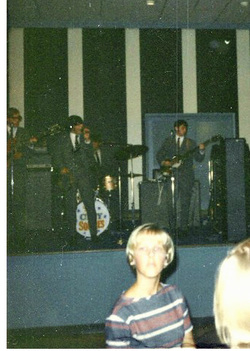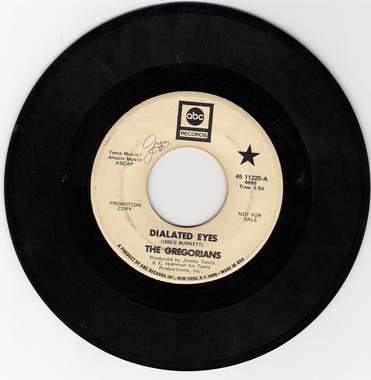
Jim and I realized that all this was fun but very temporary. We needed to get back into the recording studio. By this time Bill McCracken had left the band to relocate to Michigan with his parents (remember, we were only 17 at the time). Enter Bobby Dillinger, a fifteen-year-old dynamo whose drumsticks were an extension of his soul. When he auditioned for us it was obvious he was “our kind of people”. He was a couple of years younger than us and wasn’t the “human metronome” that Bill McCracken was but we knew that would come with time. We would return to the Playboy Lounge periodically to break in new material and get back to our roots. When we did we would often leave Bobby on stage to do a ten or fifteen minute drum solo while we had a beer (don’t tell my mom). The crowd loved him. I regret I do not have pictures of him with the band. So much has been lost over time. I must pause here to say that a lot went on during this period. We were in the studio a lot. We were also going through petty arguments (as families will). Jim even left the band for a time over some disagreements about band management and equipment. Without Jim there was no City Squires and we knew it. We made peace and moved on but we knew the magic was gone. The City Squires had become a business. Gone were the days when we didn’t even care if we got paid. The guys had car payments, equipment payments, and wanted to start accumulating wealth. We had to turn down a Las Vegas tour because I was still in school. Some of the guys got other jobs because they didn’t see us making it national. This was in spite of a recording contract with ABC-Paramount! As a matter of fact, the ABC contract helped to fuel the fire.
During our recording sessions two of the songs we recorded were “Dialated Eyes” which I wrote (yes, I misspelled dilated) and “Like A Man” which was one of Jim’s tunes. Testa sent those songs, with others we had recorded to major labels and ABC was interested in those two songs. They wanted us to contract for those and a few future recording sessions which we readily accepted. They flew a producer to Cleveland to remix the songs before pressing and wanted me to come back into the studio to redo some vocals. All went well and before long we were ABC-Paramount recording artists. One minor problem…we had no idea we had given them the authorization to change the name of the group for the record label. What did they change it to? The Gregorians! Imagine what the group thought of me. Did I know that they would use my first name as the name of the group? Wow. That sucked. We NEVER performed under that name and refused to ever use it. Being young and dumb I called ABC to ask if I could get some copies of the promotional copies they had pressed. I was surprised at how easy it was to order 100 copies shipped to my house. I thought we could use them to give out to fans, etc. I was also surprised when, a couple of weeks later, Testa almost choked me over the bill ABC had sent him for the records!

Now there were more interviews for Greg and Jim and, as you might imagine some alienation occurred. Gus and Jerry felt it was time to move on. Who could blame them? No matter how much Jim and I expressed that we were a band with no member more important than the other. Frankly, Gus and Jerry had good jobs as computer programmers and didn’t need any more of the insecurity that a life in the music industry offered. Soon thereafter I became disenchanted because it was increasingly hard to find talented musicians to fill the vacancies that seemed to occur regularly. I won’t mention all the people who came in through the revolving door but I want to mention one, because she was, and still is a dear friend. Cindy Klamut (now Kehoe) was a singer and guitar player for a girl’s group called Bridey Murphy. We had always enjoyed hearing them, so when we found she was available she came aboard. Unfortunately the band did not have much time left. Even Jim wanted to start a life with a little more security. So we went our separate ways. I went into the military service in December of 1969. But, years later, the City Squires would rise again.